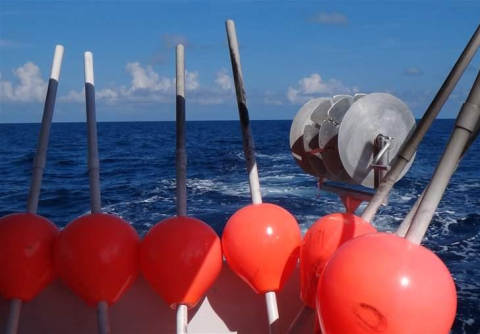The Oceanic Fish Restoration Project is helping to restore pelagic fish biomass in the Gulf of Mexico by reducing mortality of fish caught unintentionally as bycatch during fishing activities. Through the project, pelagic longline vessel owners can participate in a voluntary, temporary, six-month repose period each year. During this period, participating vessel owners refrain from pelagic longline fishing and may instead fish with alternative gear, specifically greenstick or buoy gear. Participants are compensated for taking part in the repose and for using the alternative gear.
NOAA, in partnership with the National Fish and Wildlife Foundation, launched the first repose period this year as a four-month pilot (from March 1 through June 30, 2017). NOAA evaluated implementation and further engaged with vessel owners, fish dealers, and other stakeholders. Among suggestions from the fishing community, stakeholders identified two additional fishing methods that if included in the project could help maintain landings of target catch and increase participation: (1) deep drop swordfish rigs and (2) buoy gear for targeting tuna (which requires the issuance of an exempted fish permit).
As a result, the Open Ocean Trustee Implementation Group added these two alternative fishing methods to the Oceanic Fish Restoration Project beginning in 2018. We reviewed this project change according to the Trustee Council Standard Operating Procedures. Based on that review, we determined that the addition of these fishing methods is consistent with the environmental review conducted for the project in conjunction with the Phase IV Early Restoration Plan. No further analyses under the Oil Pollution Act or the National Environmental Policy Act are necessary, and project implementation may proceed. The Evaluation of Changes to the Oceanic Fish Restoration Project can be found in the Trustees’ Administrative Record.
The Trustees selected the Oceanic Fish Restoration Project, formerly known as the Pelagic Longline Bycatch Reduction Project, in the fourth phase of early restoration. The project will continue for an estimated five to ten years. View more information about the Oceanic Fish Restoration Project.


